William Murray was one of the seven children of Mariah Murray and Henry Wilkenson. Mariah Murray was the daughter of Jesse Murray, who lived on the Murray Branch off of Long Creek in the Tyson community of southern Stanly County. The Murrays are believed to be of mixed Native American heritage, with Scottish, but were fully recognized as members of the Caucasian community. Mariah was the mother of 7 children, named in her estate papers, Ben, William, Wesley, Albert, Lydia Adeline, Mary and Eliza. Her estate was settled in 1852, with Green Wesley Simpson as the administrator. The 1860 and 1850 census records find Mariah's children living with various family members and neighbors throughout the community.
1850
Wesley and Eliza are living with Ben Murray, brother of Mariah, and their uncle.
1850
Mary is living with the Watkins family in Center, which became Norwood. The other children lived in "Ross", which would become known as Tyson Township.
1850 Lydia Adeline was living with the James F. Kendall family, also in Center.
1850 Brother Albert Murray is living with the John Norwood family, one of the proprietors of the Norwood Brothers Store.
William Murray, age 6, is living with Richard and Rebecca Poplin. Rebecca Poplin was Rebecca Murray Poplin, daughter of Jesse Murray and a sister to William's mother Mariah.
10 years later, he was still living with Richard and Becky, who had no children, as well as Richard's father and Elizabeth Randle, an older lady, whom at this point, I don't know if she bore any relation to the family at all.
William may have been one of the darker-skinned children of Mariah, as his brother Albert, at times, was able to be taken for white.
In 1860, the other siblings are found:
Albert living with the Martin McSwain family.
Mary Jane and sister Eliza were living with the James Ross family, whom I believe were related to the Murray family. The Rosses and Murrays were very tightly interwoven. Mary Jane has now married a Haliwa-Saponi named Simeon Manual who hailed from the eastern part of the state.
Ben is not to be found, only being mentioned in the estate records. He may have passed away or he may have been the oldest son and migrated west. He may have been named for Mariah's brother Benjamin Murray, or for an older relative. I believe the patriarch, Jesse Murray, who was in Chatham County before migrating to the Anson/Stanly County area, was the son of a Benjamin Murray. His mother, who left a will, was Jane Murray. Jesse named his oldest daughter Jane. Jane also had 3 children, two sons and a daughter, without the benefit of marriage. The father of her children appears to be Joshua C. Burris. One of her sons was named Solomon, for Joshua's father, Burris patriarch, Solomon, and her daughter was named Judith, the name of Joshua C. Burris's mother.
Mariah's children are noted in the records as being mulatto, while everyone in their mothers family are labeled white. There are other Murray children living in other homes in these same census records. These were the children of Mariahs brother James Murray, who appears in 1840 with 3 children in his household, but in tax records appears to be suffering from some debilitating illness during the latter 1840's. The Wadesboro Argus reports his death in 1850 and his wife, Martha Laxton Murray, remarries widower Andrew Boone in 1851. James children are counted as white.
Henry Wilkenson is named in the marriage licenses and death certificates of the two Murray children I have been able to trace with a degree of certainty, Albert and Lydia Adeline. I have even been in contact with some of their descendants. There was one Wilkenson family in this area in the first half of the 1800's, that of Jonathan Wilkenson. Jonathan Wilkenson had one slave, a man. This man is named in a transfer of his ownership from Jonathan to his son James. The man's name was Henry. Jonathan Wilkenson lived near Jesse Murray, in the same area, along the same creek. I believe it was this Henry Wilkenson, slave of Jonathan and James Wilkenson, who was the father of Mariah Murrays children.
William Murray was one of Moriahs children that I was not able to find the fate of after 1860. That is, until I began digging through the Supreme Court records of early Stanly County.
William Murray was on trial in 1867 for the rape of Jemimia Motley.
Jemima Motley was the daughter of Ransom Motley and became the third wife of Eli Ransom Herrin after her sister Sarah, his first wife died. He had a very short and mysterious marriage to a Pearlene M. Gray Dry between the two sisters. Jemima married Eli R. Herrin in 1871.
She is featured in my post concerning her son, Josesph Marshall Herrin. The Name Thief: Joseph Marshall Herrin
The trial began this way.
Minutes of September 1867, p115 Stanly County, North Carolina
State vs William Murry - (charge) Rape
Jury- Martin McSwain, William Maners, WS Swaringen, Jonas Hartsell, John B Thompson, DM Ross, Jacob Eury, JT Smith, LT Biles, Wlm C Thompson, James Cagle, JC Burris,
Guilty
State of North Carolina, Stanly County Superior Court
Fall Term of 1866 The Jurors of the State upon their oaths present that William Murray (a person of color), late of the county of Stanly, not having the fear of God before his eyes but being moved and seduced by the instigation of the devil on the Sixth day of July in the year of our Lord one thousand eight hundred and sixty-six, with force and arms at and in the county aforesaid in and upon one Jemima Motley in the Peace of God and the State then and there being violently and feloniously did make an assault on her, the said Jemima Motley, then and there brutally against her will feloniously did ravish and carnally know against the forms of the statute in such case made and provided against the peace and dignity of the State.
N McKay, Soliciter
Returned a True bill R M Lanier, Foreman Sept 1867
Cont. on page 117 Therefore let a jury of good and lawful men by whom the truth of the matter may be known, the prisoner William Murray is remanded to jail, and at the same term of court, the said William Murray is again brought to the bar of the said court, in the custody of the said Jonathan Mann, Sheriff of Stanly County and offers an affidavit for a continuance which was considered by the court to be sufficient cause for a continuance, where upon the prisoner was remanded to jail.
-Be it remembered 1st Monday of March, Court of Stanly county, Courthouse in Albemarle 1867
Hon. Daniel G Fowle (or Fowler), Judge. Prisoner William Murray continued.
Judge E J Warren - William Murray, Custodian: Jonathan Mann Jury under oath say that William Murray is guilty of the felony of rape in manner and form as charged in the Bill of Indictment.
William Murray "who nothing further saith than he has already said", Whereupon all and singular the premises being seen and by the Court here fully understood, the said William Murray to be taken to the jail of Stanly County to remain until he is taken by the Sheriff to the place of public execution of said County between the hours of 12 and 2 o'clock pm and there be hanged by the neck until he be Dead and it is further considered that the State do recover of the said William Murray the cost of his prosecution.
-Rule for a new trial. Rule made absolute and a new trial granted.
It was with great interest and eagerness that I scanned through the court records looking for the results of William Murray's appeal. He was sentenced to hang. I have heard over the years that Alec Whitley had been the only man to have been hung in Stanly County.
Find A Grave link to the Grave and Story of Alec Whitley
Much has been researched and recorded on Alec Whitley, the son of Joshua Christian Burris and Susannah Whitley, who was accused of the murder of Burton Tucker, a school teacher, all from Stanly County, North Carolina, but who had fled to Arkansas amidst controversy, but had been brought back from Arkansas and was broken out of the county jail and hanged.
The following is a newspaper account of this story from the June 16, 1892 Carolina Watchman, Salisbury, NC.
![Alex Whitley hanging]()
So, knowing that the lynching of Alexander "Alec" Whitley was the only one to be known or recorded in Stanly County, the fate of William Murray, nephew of my third Great-Grandmother, Priscilla Murray Aldridge, lie before me as a grand mystery.
Certainly, the crime he was accused of would have been a sensational one for the times. Just a few years past the Civil War, in the hot July summer of 1866, he, a 21 one year old mixed race man, whose mother was considered white and whose father had been the slave of one of her neighbors, was accused of the violation and assault upon a white girl in his own county. Certainly a hanging under these circumstances would have made the papers of the surrounding metro-areas of Wadesboro, Salisbury or Concord, if not the state newspapers or the ones out of the state capital of Raleigh.
Jemima had married her sisters' widower in 1871. What had happened to the accused and convicted William Murray?
![]()
The next term of court appeared with this statement. This was the fourth time William Murray was brought to court, the first being the Fall Term of 1866 and the second being the Spring Term and 1867 and the third being the Fall Term of 1867.
Minutes of Spring Term 1868
State vs William Murray- Rape
The Prisoner William Murray is again brought to court in his proper person and the jurors by the sheriff returned to wit:
William E Davis, Michael Dry, William Hatley Sr., John S. Atkins, BF Snuggs, John A. Troutman, EM Brooks, Wm P. McLester, John R Ivey, William M. Kirk, Elisha Laton, BF Davis.
The prisoner William Murray being brought to the bar of the court in the custody of the sheriff, it is further demanded of him where of the said court here upon the premises and verdict aforesaid out not to proceed to judgement and execution against him who nothing further saith unless as he before had said whereupon all and singular the premises being seen and by the said court here fully understood, It is considered by the court here that the said William Murray be taken to the jail of Stanly County from where he came and be there safely confined until Friday, the 17th day of April, 1868 AD, and that on that day be taken to the place of common execution between the hours of 10 o'clock am and 3 o'clock pm and there be hanged by the neck until he be dead. It is ordered by the court that the Sheriff of Stanly County carry the foregoing Judgement and Sentence into Execution.
Rule for a new trial, rule discharged. An appeal craved and granted. To the satisfaction of the Supreme Court and it appearing to the court that the prisoner is not worth $200 and can not give security, he is permitted to appeal without security.
So, once again, William Murray had escaped final judgement with an appeal, so the search for his fate waged on. Certainly such a controversial crime in such a chaotic and pained era would have made the records and the news.
No mention is made of William Murray in the Fall Term of 1868 or the Spring Term of 1869. I did find this in the newspapers.
![]()
Wilmington Journal
3 Jul 1868, Fri • Page 1
I had to look online for the definition of "venire de novo". This is what I found. So, there was some error declared in the trial, to where a new trial was ordered.
Judicial order for a new trial after the first trial is declared a mistrial due to a fundamental or gross irregularity such as where the case was outside of the court's jurisdiction."
The trial of William Murray could not have came at a worse time in the history of Stanly County for a young man of his complexion. About 26 years old in 1868, an accused of the assault and rape of a completely Caucasian young farm girl. What the 'conservative' survivors of the Confederate army and haters of northern influence were warning everyone who would listen about. In 1868, the flames of the KKK were burning in all corners of North Carolina with a vengence. Articles like that below could be found in every paper and expresses the attitudes and atmosphere of Stanly County at the time of the trial.
![]()
![]()
![]()
The Daily Journal
15 Apr 1868, Wed • Page 2
And from the same edition of "The Daily Journal", from Wilmington, NC.
![]()
By 1869, some patriotism for the country as a unified entity, was beginning to blossom within the confines of Stanly County as shown in this article from Raleigh's "The Daily Standard'.
![]()
The political atmosphere of Stanly County in the late 1860's was turbulent at the least and hostile at the worst and William's trial could not have came at a more volatile time. But where was the story of his hanging and what caused the error in his trial?
![]()
Newbern Journal of Commerce
31 Aug 1867, Sat • Page 1
I skimmed through my treasured disks, from the State Archives, that told the tales of the Supreme Court cases of Antebellum and Reconstruction Era Stanly County, North Carolina, patiently and anxiously looking for the ending of William Murray's story. 1869 went by with no mention of him, then 1870 and then into 1871. Certainly he was not maintained in jail longer than that without trial, and if he died in jail, or if he was hung, would not his controversial case have been reported.
I decided to look into the newspapers again, and narrow down the time frame, focusing on the year 1868. And I found him.
![]()
The Tri-Weekly Old North State
(Salisbury, North Carolina)9 May 1868, Sat • Page 2
William (or Bill) had escaped. And he was not alone. The ploy of begging for continuances had worked and dragged out long enough to save his life. Did he have help? Perhaps one of the Murrays? Maybe his brother Albert, who was having legal problems of his own as his marriage to his first cousin, Mary Jane Whitaker, daughter of Nelson and Sophia Whitaker,was being challenged and the young married couple was being called into court on charges of fornication, as the law did not want to recognize their marriage as legal. Despite her Native American background, Mary Jane Whitaker was considered white, her father was white, and while their mothers were sisters, the father of Albert Murray was African-American and as he was called a mulatto, their marriage was challenged. Mary Jane's sister, Glennie Wilmartha Whitaker, had also married a first cousin, John Adam Aldridge, son of their aunt, Priscilla "Prussia" Murray Aldridge, but their was no challenge to the marriage between cousins, skin color was the issue, and John Adam's father, Henry Garner Aldridge, was white.
![]()
The Wilmington Morning Star
(Wilmington, North Carolina)28 Apr 1868, Tue • Page 2
So who was Nick Williams and would he help to find William Murray?
![]()
Wilmington Journal
(Wilmington, North Carolina)27 Mar 1868, Fri • Page 1
![]()
The Wilmington Morning Star
(Wilmington, North Carolina)26 Jan 1868, Sun • Page 2
So Nick Williams was from the North, and had been tried and sentenced already. Why he was in the jail in Albemarle, instead of in Wadesboro was unknown.
I've made no other discoveries on the case of William Murray. There may be something left to find, but from all appearances, he made good his escape, and was never found, not that any newspapers had reported. Where he and Nick Williams went was unknown. Maybe they changed their names. In 1868, the Civil War had passed and persons of color, for once, could and were traveling about at will. Seeing two men of African ancestory, one "bright" and one dark, would not have been an unusual thing to see, especially if they were heading north.
Did they change their names and identities? Maybe. Or maybe not. There were no less than 4 William Murrays of his approximate age and hue enumerated around the country in years to come, one in Tennessee, one in Ohio, one in St. Louis, Missouri and one in Michigan. Could any of those have been this Bill Murray? Possibly, but that might prove impossible to acertain.
As the case rests, I still can't help but wonder if he was really guilty. Were William and Jemima a young couple with a mutual attraction, and when caught together, Jemima had to claim "rape" in order to appease her father and save face and reputation? Or was he actually guilty of the horrid crime? Multiple judges seemed to have doubt in his guilt as both Warren and Fowler ordered a retrial and approved an appeal. The community seemed to have no issue with the relationship between Pinkney Carpenter, son of Williamson and Sallie McIntyre Carpenter and William's sister, Lydia Adeline. They had 2, possibly 3 children, before she moved to Cabarrus County.
All we can be sure of is the facts of the case. Bill Murray, aged 23, was arrested, tried, found guilty, sentenced to hang, appealed, appeal granted and mistrial declared, and new trial granted, and then he escaped in the company of another man.
If somewhere, the spirit of William Murray is wanting his fate to be found, then I am sure one day, I will.
1850
Wesley and Eliza are living with Ben Murray, brother of Mariah, and their uncle.
| Name: | Wesley Murray | ||||||||||||||
|---|---|---|---|---|---|---|---|---|---|---|---|---|---|---|---|
| Age: | 5 | ||||||||||||||
| Birth Year: | abt 1845 | ||||||||||||||
| Birthplace: | North Carolina | ||||||||||||||
| Home in 1850: | Ross, Stanly, North Carolina | ||||||||||||||
| Race: | Mulatto (Black) | ||||||||||||||
| Gender: | Male | ||||||||||||||
| Family Number: | 779 | ||||||||||||||
| Household Members: |
|
1850
Mary is living with the Watkins family in Center, which became Norwood. The other children lived in "Ross", which would become known as Tyson Township.
| Name: | Mary Murray | ||||||||||
|---|---|---|---|---|---|---|---|---|---|---|---|
| Age: | 14 | ||||||||||
| Birth Year: | abt 1836 | ||||||||||
| Birthplace: | North Carolina | ||||||||||
| Home in 1850: | Centre, Stanly, North Carolina | ||||||||||
| Race: | Mulatto (Black) | ||||||||||
| Gender: | Female | ||||||||||
| Family Number: | 101 | ||||||||||
| Household Members: |
|
1850 Lydia Adeline was living with the James F. Kendall family, also in Center.
| Name: | Lydia Murray | ||||||||||||||
|---|---|---|---|---|---|---|---|---|---|---|---|---|---|---|---|
| Age: | 8 | ||||||||||||||
| Birth Year: | abt 1842 | ||||||||||||||
| Birthplace: | North Carolina | ||||||||||||||
| Home in 1850: | Centre, Stanly, North Carolina | ||||||||||||||
| Race: | Mulatto (Black) | ||||||||||||||
| Gender: | Female | ||||||||||||||
| Family Number: | 88 | ||||||||||||||
| Household Members: |
|
1850 Brother Albert Murray is living with the John Norwood family, one of the proprietors of the Norwood Brothers Store.
| Name: | Albert Murray | ||||||||||
|---|---|---|---|---|---|---|---|---|---|---|---|
| Age: | 11 | ||||||||||
| Birth Year: | abt 1839 | ||||||||||
| Birthplace: | North Carolina | ||||||||||
| Home in 1850: | Centre, Stanly, North Carolina | ||||||||||
| Race: | Mulatto (Black) | ||||||||||
| Gender: | Male | ||||||||||
| Family Number: | 94 | ||||||||||
| Household Members: |
|
William Murray, age 6, is living with Richard and Rebecca Poplin. Rebecca Poplin was Rebecca Murray Poplin, daughter of Jesse Murray and a sister to William's mother Mariah.
| Name: | Wm Murray | ||||||||
|---|---|---|---|---|---|---|---|---|---|
| Age: | 6 | ||||||||
| Birth Year: | abt 1844 | ||||||||
| Birthplace: | North Carolina | ||||||||
| Home in 1850: | Ross, Stanly, North Carolina | ||||||||
| Race: | Mulatto (Black) | ||||||||
| Gender: | Male | ||||||||
| Family Number: | 800 | ||||||||
| Household Members: |
|
10 years later, he was still living with Richard and Becky, who had no children, as well as Richard's father and Elizabeth Randle, an older lady, whom at this point, I don't know if she bore any relation to the family at all.
| Name: | William Murry | ||||||||||||
|---|---|---|---|---|---|---|---|---|---|---|---|---|---|
| Age in 1860: | 15 | ||||||||||||
| Birth Year: | abt 1845 | ||||||||||||
| Home in 1860: | Stanly, North Carolina | ||||||||||||
| Race: | Black | ||||||||||||
| Gender: | Male | ||||||||||||
| Post Office: | Albemarle | ||||||||||||
| Value of real estate: | View image | ||||||||||||
| Household Members: |
|
William may have been one of the darker-skinned children of Mariah, as his brother Albert, at times, was able to be taken for white.
| RiverView Grist Mill on the Rocky River below Norwood, NC circa 1900, Stanly County Museum |
In 1860, the other siblings are found:
Albert living with the Martin McSwain family.
| Name: | Albert Murrey | ||||||||||||||
|---|---|---|---|---|---|---|---|---|---|---|---|---|---|---|---|
| Age in 1860: | 21 | ||||||||||||||
| Birth Year: | abt 1839 | ||||||||||||||
| Home in 1860: | Stanly, North Carolina | ||||||||||||||
| Race: | Mulatto (Black) | ||||||||||||||
| Gender: | Male | ||||||||||||||
| Post Office: | Albemarle | ||||||||||||||
| Value of real estate: | View image | ||||||||||||||
| Household Members: |
|
Mary Jane and sister Eliza were living with the James Ross family, whom I believe were related to the Murray family. The Rosses and Murrays were very tightly interwoven. Mary Jane has now married a Haliwa-Saponi named Simeon Manual who hailed from the eastern part of the state.
| Mary Jane [Mary Jane Murra] [Mary Jane Murray] | |||||||||||||||||||||
| Age in 1860: | 22 | ||||||||||||||||||||
|---|---|---|---|---|---|---|---|---|---|---|---|---|---|---|---|---|---|---|---|---|---|
| Birth Year: | abt 1838 | ||||||||||||||||||||
| Home in 1860: | Stanly, North Carolina | ||||||||||||||||||||
| Race: | Mulatto (Black) | ||||||||||||||||||||
| Gender: | Female | ||||||||||||||||||||
| Post Office: | Albemarle | ||||||||||||||||||||
| Value of real estate: | View image | ||||||||||||||||||||
| Household Members: |
|
Wesley still living with his uncle Ben Murray.
| Name: | Wesley Merry [Wesley Murray] | ||||||||
|---|---|---|---|---|---|---|---|---|---|
| Age in 1860: | 15 | ||||||||
| Birth Year: | abt 1845 | ||||||||
| Home in 1860: | Stanly, North Carolina | ||||||||
| Race: | Black | ||||||||
| Gender: | Male | ||||||||
| Post Office: | Albemarle | ||||||||
| Value of real estate: | View image | ||||||||
| Household Members: |
|
Lydia Adeline was still living with the James F. Kendall family and would end up having children by Pinkney Carpenter, a white teen about her age, before she moved to Cabarrus County and married later Adam Faggart and raise her family there.
| Name: | Lydia A Murry | ||||||||||||||||||||||||||
|---|---|---|---|---|---|---|---|---|---|---|---|---|---|---|---|---|---|---|---|---|---|---|---|---|---|---|---|
| Age in 1860: | 17 | ||||||||||||||||||||||||||
| Birth Year: | abt 1843 | ||||||||||||||||||||||||||
| Home in 1860: | Stanly, North Carolina | ||||||||||||||||||||||||||
| Race: | Mulatto (Black) | ||||||||||||||||||||||||||
| Gender: | Female | ||||||||||||||||||||||||||
| Post Office: | Albemarle | ||||||||||||||||||||||||||
| Value of real estate: | View image | ||||||||||||||||||||||||||
| Household Members: |
|
And William Murray was living with his Aunt Becky.
| Bennett's Ferry near Norwood, NC circa 1915-1930, Stanly County Museum |
Ben is not to be found, only being mentioned in the estate records. He may have passed away or he may have been the oldest son and migrated west. He may have been named for Mariah's brother Benjamin Murray, or for an older relative. I believe the patriarch, Jesse Murray, who was in Chatham County before migrating to the Anson/Stanly County area, was the son of a Benjamin Murray. His mother, who left a will, was Jane Murray. Jesse named his oldest daughter Jane. Jane also had 3 children, two sons and a daughter, without the benefit of marriage. The father of her children appears to be Joshua C. Burris. One of her sons was named Solomon, for Joshua's father, Burris patriarch, Solomon, and her daughter was named Judith, the name of Joshua C. Burris's mother.
Mariah's children are noted in the records as being mulatto, while everyone in their mothers family are labeled white. There are other Murray children living in other homes in these same census records. These were the children of Mariahs brother James Murray, who appears in 1840 with 3 children in his household, but in tax records appears to be suffering from some debilitating illness during the latter 1840's. The Wadesboro Argus reports his death in 1850 and his wife, Martha Laxton Murray, remarries widower Andrew Boone in 1851. James children are counted as white.
Henry Wilkenson is named in the marriage licenses and death certificates of the two Murray children I have been able to trace with a degree of certainty, Albert and Lydia Adeline. I have even been in contact with some of their descendants. There was one Wilkenson family in this area in the first half of the 1800's, that of Jonathan Wilkenson. Jonathan Wilkenson had one slave, a man. This man is named in a transfer of his ownership from Jonathan to his son James. The man's name was Henry. Jonathan Wilkenson lived near Jesse Murray, in the same area, along the same creek. I believe it was this Henry Wilkenson, slave of Jonathan and James Wilkenson, who was the father of Mariah Murrays children.
William Murray was one of Moriahs children that I was not able to find the fate of after 1860. That is, until I began digging through the Supreme Court records of early Stanly County.
William Murray was on trial in 1867 for the rape of Jemimia Motley.
Jemima Motley was the daughter of Ransom Motley and became the third wife of Eli Ransom Herrin after her sister Sarah, his first wife died. He had a very short and mysterious marriage to a Pearlene M. Gray Dry between the two sisters. Jemima married Eli R. Herrin in 1871.
She is featured in my post concerning her son, Josesph Marshall Herrin. The Name Thief: Joseph Marshall Herrin
The trial began this way.
Minutes of September 1867, p115 Stanly County, North Carolina
State vs William Murry - (charge) Rape
Jury- Martin McSwain, William Maners, WS Swaringen, Jonas Hartsell, John B Thompson, DM Ross, Jacob Eury, JT Smith, LT Biles, Wlm C Thompson, James Cagle, JC Burris,
Guilty
State of North Carolina, Stanly County Superior Court
Fall Term of 1866 The Jurors of the State upon their oaths present that William Murray (a person of color), late of the county of Stanly, not having the fear of God before his eyes but being moved and seduced by the instigation of the devil on the Sixth day of July in the year of our Lord one thousand eight hundred and sixty-six, with force and arms at and in the county aforesaid in and upon one Jemima Motley in the Peace of God and the State then and there being violently and feloniously did make an assault on her, the said Jemima Motley, then and there brutally against her will feloniously did ravish and carnally know against the forms of the statute in such case made and provided against the peace and dignity of the State.
N McKay, Soliciter
Returned a True bill R M Lanier, Foreman Sept 1867
Cont. on page 117 Therefore let a jury of good and lawful men by whom the truth of the matter may be known, the prisoner William Murray is remanded to jail, and at the same term of court, the said William Murray is again brought to the bar of the said court, in the custody of the said Jonathan Mann, Sheriff of Stanly County and offers an affidavit for a continuance which was considered by the court to be sufficient cause for a continuance, where upon the prisoner was remanded to jail.
-Be it remembered 1st Monday of March, Court of Stanly county, Courthouse in Albemarle 1867
Hon. Daniel G Fowle (or Fowler), Judge. Prisoner William Murray continued.
Judge E J Warren - William Murray, Custodian: Jonathan Mann Jury under oath say that William Murray is guilty of the felony of rape in manner and form as charged in the Bill of Indictment.
William Murray "who nothing further saith than he has already said", Whereupon all and singular the premises being seen and by the Court here fully understood, the said William Murray to be taken to the jail of Stanly County to remain until he is taken by the Sheriff to the place of public execution of said County between the hours of 12 and 2 o'clock pm and there be hanged by the neck until he be Dead and it is further considered that the State do recover of the said William Murray the cost of his prosecution.
-Rule for a new trial. Rule made absolute and a new trial granted.
It was with great interest and eagerness that I scanned through the court records looking for the results of William Murray's appeal. He was sentenced to hang. I have heard over the years that Alec Whitley had been the only man to have been hung in Stanly County.
Find A Grave link to the Grave and Story of Alec Whitley
Much has been researched and recorded on Alec Whitley, the son of Joshua Christian Burris and Susannah Whitley, who was accused of the murder of Burton Tucker, a school teacher, all from Stanly County, North Carolina, but who had fled to Arkansas amidst controversy, but had been brought back from Arkansas and was broken out of the county jail and hanged.
The following is a newspaper account of this story from the June 16, 1892 Carolina Watchman, Salisbury, NC.
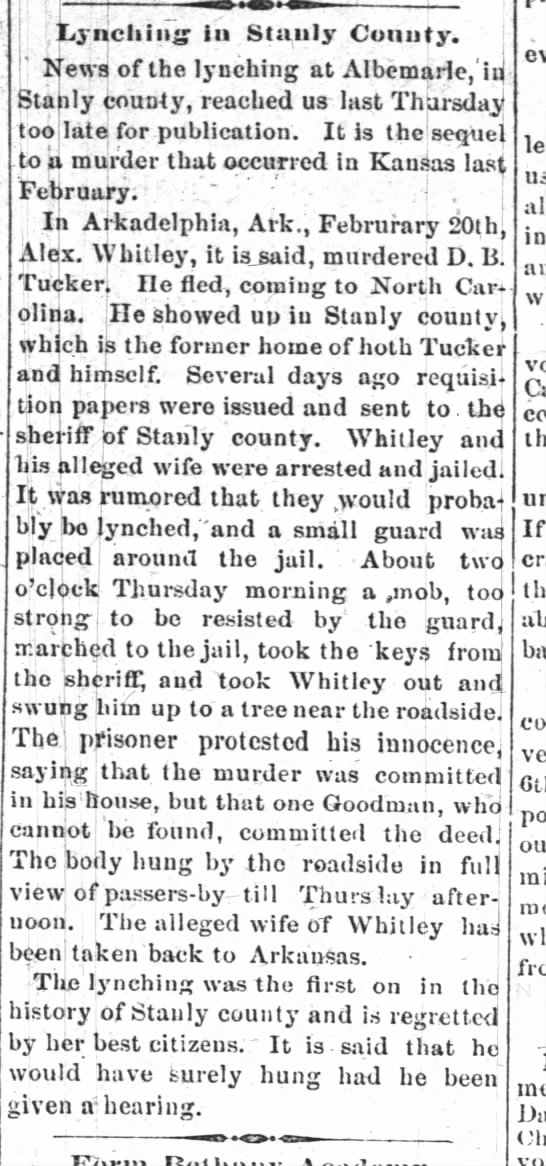
So, knowing that the lynching of Alexander "Alec" Whitley was the only one to be known or recorded in Stanly County, the fate of William Murray, nephew of my third Great-Grandmother, Priscilla Murray Aldridge, lie before me as a grand mystery.
Certainly, the crime he was accused of would have been a sensational one for the times. Just a few years past the Civil War, in the hot July summer of 1866, he, a 21 one year old mixed race man, whose mother was considered white and whose father had been the slave of one of her neighbors, was accused of the violation and assault upon a white girl in his own county. Certainly a hanging under these circumstances would have made the papers of the surrounding metro-areas of Wadesboro, Salisbury or Concord, if not the state newspapers or the ones out of the state capital of Raleigh.
Jemima had married her sisters' widower in 1871. What had happened to the accused and convicted William Murray?

The next term of court appeared with this statement. This was the fourth time William Murray was brought to court, the first being the Fall Term of 1866 and the second being the Spring Term and 1867 and the third being the Fall Term of 1867.
Minutes of Spring Term 1868
State vs William Murray- Rape
The Prisoner William Murray is again brought to court in his proper person and the jurors by the sheriff returned to wit:
William E Davis, Michael Dry, William Hatley Sr., John S. Atkins, BF Snuggs, John A. Troutman, EM Brooks, Wm P. McLester, John R Ivey, William M. Kirk, Elisha Laton, BF Davis.
The prisoner William Murray being brought to the bar of the court in the custody of the sheriff, it is further demanded of him where of the said court here upon the premises and verdict aforesaid out not to proceed to judgement and execution against him who nothing further saith unless as he before had said whereupon all and singular the premises being seen and by the said court here fully understood, It is considered by the court here that the said William Murray be taken to the jail of Stanly County from where he came and be there safely confined until Friday, the 17th day of April, 1868 AD, and that on that day be taken to the place of common execution between the hours of 10 o'clock am and 3 o'clock pm and there be hanged by the neck until he be dead. It is ordered by the court that the Sheriff of Stanly County carry the foregoing Judgement and Sentence into Execution.
Rule for a new trial, rule discharged. An appeal craved and granted. To the satisfaction of the Supreme Court and it appearing to the court that the prisoner is not worth $200 and can not give security, he is permitted to appeal without security.
So, once again, William Murray had escaped final judgement with an appeal, so the search for his fate waged on. Certainly such a controversial crime in such a chaotic and pained era would have made the records and the news.
No mention is made of William Murray in the Fall Term of 1868 or the Spring Term of 1869. I did find this in the newspapers.
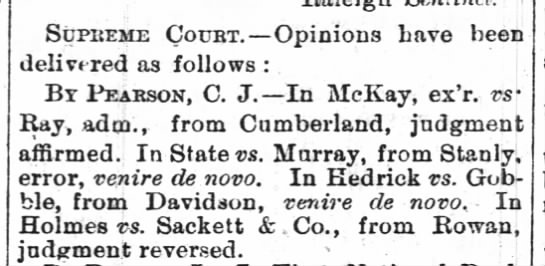
Wilmington Journal
3 Jul 1868, Fri • Page 1
I had to look online for the definition of "venire de novo". This is what I found. So, there was some error declared in the trial, to where a new trial was ordered.
Judicial order for a new trial after the first trial is declared a mistrial due to a fundamental or gross irregularity such as where the case was outside of the court's jurisdiction."
The trial of William Murray could not have came at a worse time in the history of Stanly County for a young man of his complexion. About 26 years old in 1868, an accused of the assault and rape of a completely Caucasian young farm girl. What the 'conservative' survivors of the Confederate army and haters of northern influence were warning everyone who would listen about. In 1868, the flames of the KKK were burning in all corners of North Carolina with a vengence. Articles like that below could be found in every paper and expresses the attitudes and atmosphere of Stanly County at the time of the trial.
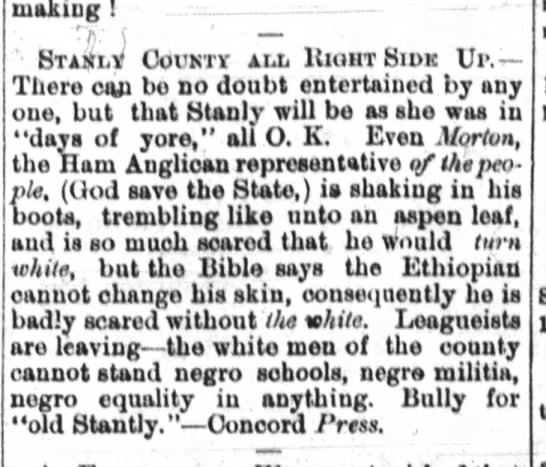
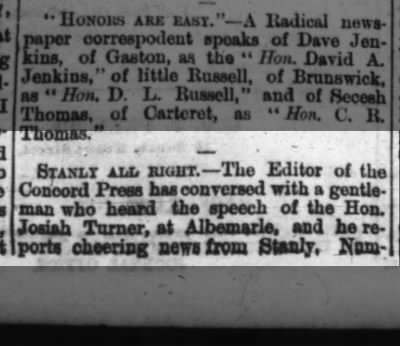
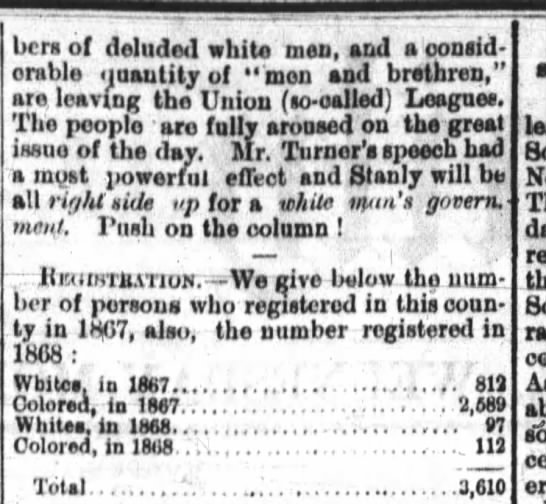
The Daily Journal
15 Apr 1868, Wed • Page 2
And from the same edition of "The Daily Journal", from Wilmington, NC.
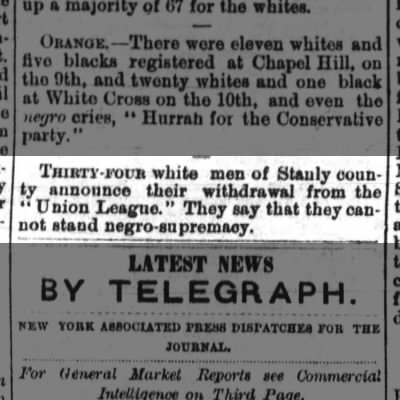
By 1869, some patriotism for the country as a unified entity, was beginning to blossom within the confines of Stanly County as shown in this article from Raleigh's "The Daily Standard'.
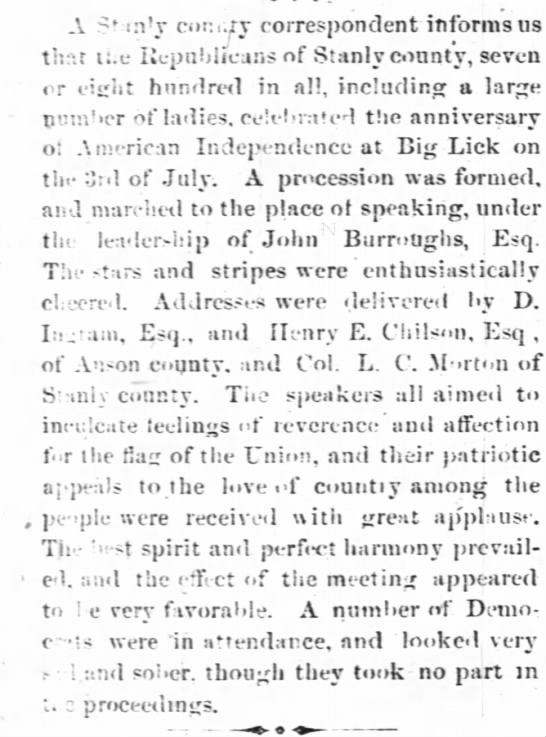
The political atmosphere of Stanly County in the late 1860's was turbulent at the least and hostile at the worst and William's trial could not have came at a more volatile time. But where was the story of his hanging and what caused the error in his trial?
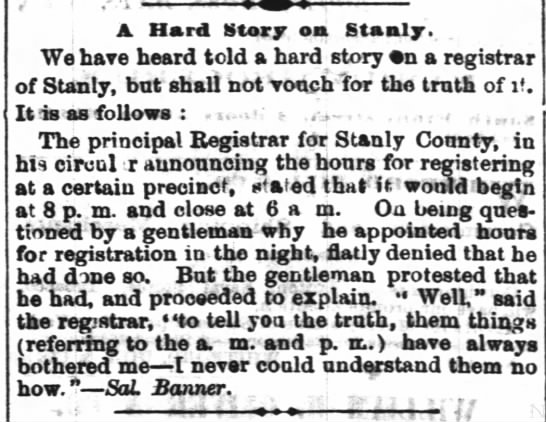
Newbern Journal of Commerce
31 Aug 1867, Sat • Page 1
I skimmed through my treasured disks, from the State Archives, that told the tales of the Supreme Court cases of Antebellum and Reconstruction Era Stanly County, North Carolina, patiently and anxiously looking for the ending of William Murray's story. 1869 went by with no mention of him, then 1870 and then into 1871. Certainly he was not maintained in jail longer than that without trial, and if he died in jail, or if he was hung, would not his controversial case have been reported.
I decided to look into the newspapers again, and narrow down the time frame, focusing on the year 1868. And I found him.
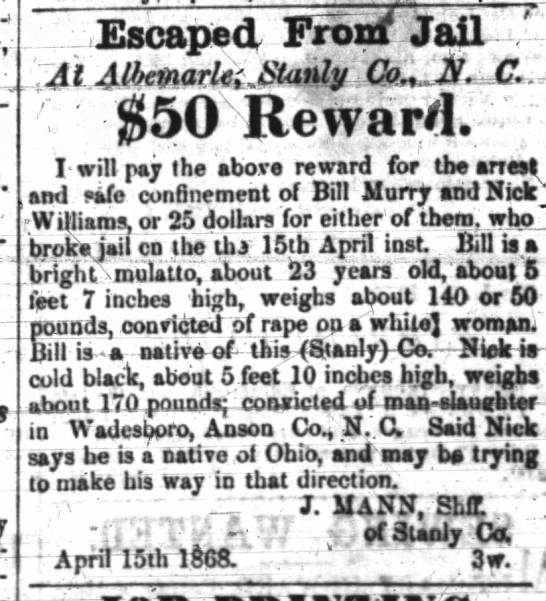
The Tri-Weekly Old North State
(Salisbury, North Carolina)9 May 1868, Sat • Page 2
William (or Bill) had escaped. And he was not alone. The ploy of begging for continuances had worked and dragged out long enough to save his life. Did he have help? Perhaps one of the Murrays? Maybe his brother Albert, who was having legal problems of his own as his marriage to his first cousin, Mary Jane Whitaker, daughter of Nelson and Sophia Whitaker,was being challenged and the young married couple was being called into court on charges of fornication, as the law did not want to recognize their marriage as legal. Despite her Native American background, Mary Jane Whitaker was considered white, her father was white, and while their mothers were sisters, the father of Albert Murray was African-American and as he was called a mulatto, their marriage was challenged. Mary Jane's sister, Glennie Wilmartha Whitaker, had also married a first cousin, John Adam Aldridge, son of their aunt, Priscilla "Prussia" Murray Aldridge, but their was no challenge to the marriage between cousins, skin color was the issue, and John Adam's father, Henry Garner Aldridge, was white.
 |
| John Adam Aldridge and wife, Glennie W. Whitaker Aldridge |
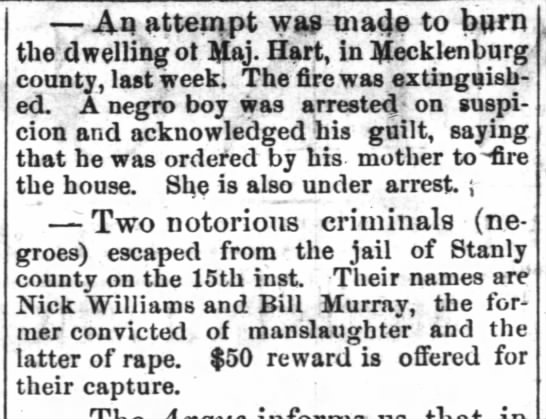
The Wilmington Morning Star
(Wilmington, North Carolina)28 Apr 1868, Tue • Page 2
So who was Nick Williams and would he help to find William Murray?
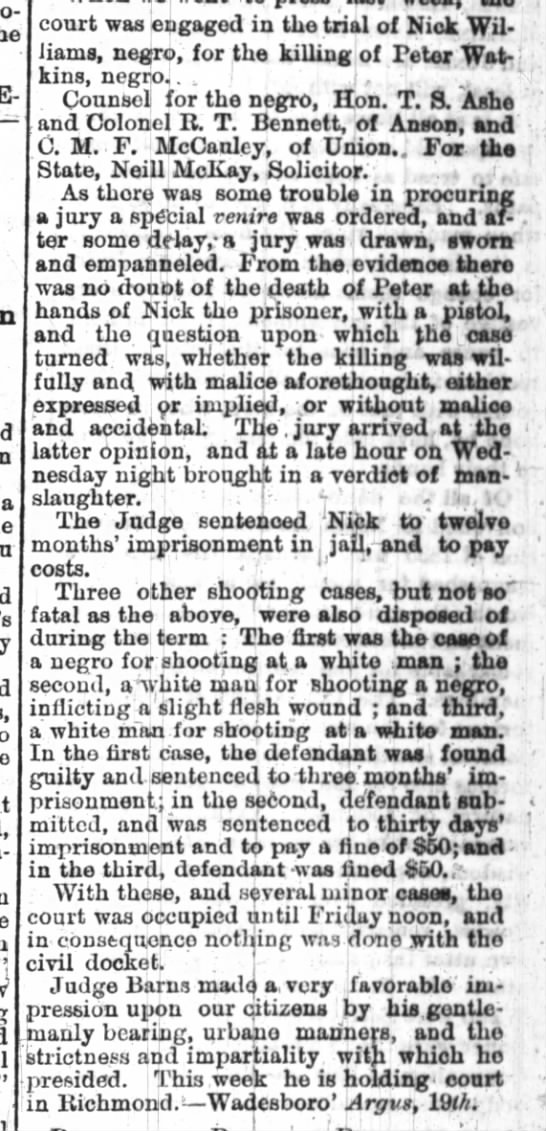
Wilmington Journal
(Wilmington, North Carolina)27 Mar 1868, Fri • Page 1
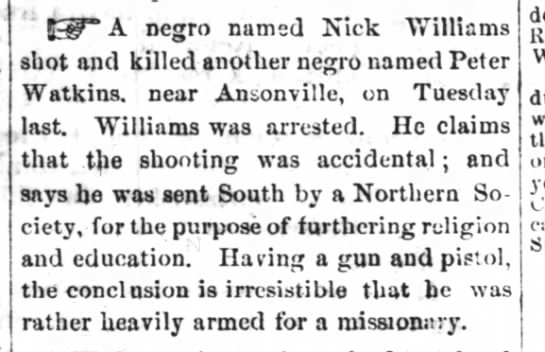
The Wilmington Morning Star
(Wilmington, North Carolina)26 Jan 1868, Sun • Page 2
So Nick Williams was from the North, and had been tried and sentenced already. Why he was in the jail in Albemarle, instead of in Wadesboro was unknown.
I've made no other discoveries on the case of William Murray. There may be something left to find, but from all appearances, he made good his escape, and was never found, not that any newspapers had reported. Where he and Nick Williams went was unknown. Maybe they changed their names. In 1868, the Civil War had passed and persons of color, for once, could and were traveling about at will. Seeing two men of African ancestory, one "bright" and one dark, would not have been an unusual thing to see, especially if they were heading north.
Did they change their names and identities? Maybe. Or maybe not. There were no less than 4 William Murrays of his approximate age and hue enumerated around the country in years to come, one in Tennessee, one in Ohio, one in St. Louis, Missouri and one in Michigan. Could any of those have been this Bill Murray? Possibly, but that might prove impossible to acertain.
As the case rests, I still can't help but wonder if he was really guilty. Were William and Jemima a young couple with a mutual attraction, and when caught together, Jemima had to claim "rape" in order to appease her father and save face and reputation? Or was he actually guilty of the horrid crime? Multiple judges seemed to have doubt in his guilt as both Warren and Fowler ordered a retrial and approved an appeal. The community seemed to have no issue with the relationship between Pinkney Carpenter, son of Williamson and Sallie McIntyre Carpenter and William's sister, Lydia Adeline. They had 2, possibly 3 children, before she moved to Cabarrus County.
All we can be sure of is the facts of the case. Bill Murray, aged 23, was arrested, tried, found guilty, sentenced to hang, appealed, appeal granted and mistrial declared, and new trial granted, and then he escaped in the company of another man.
If somewhere, the spirit of William Murray is wanting his fate to be found, then I am sure one day, I will.